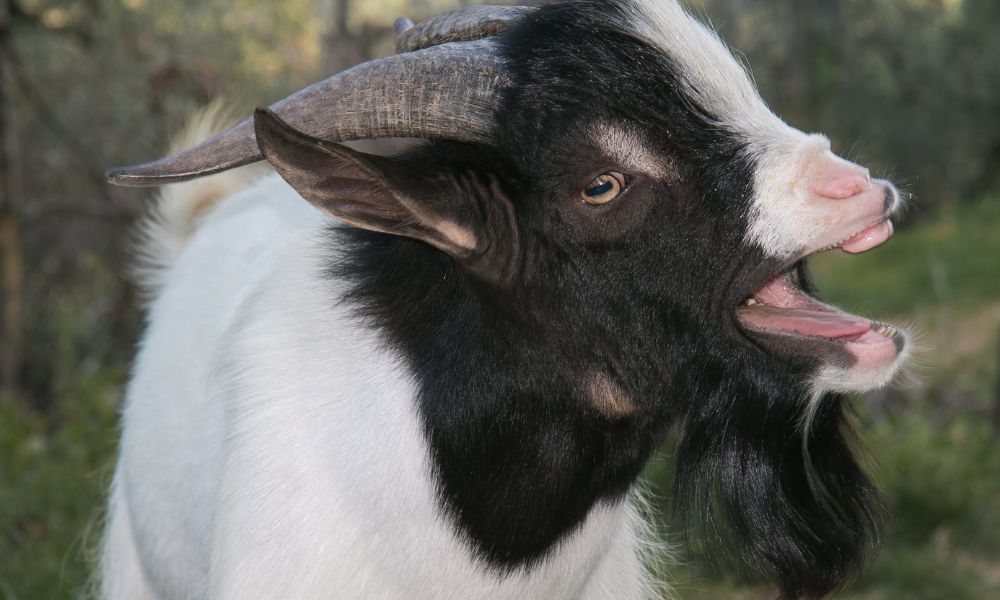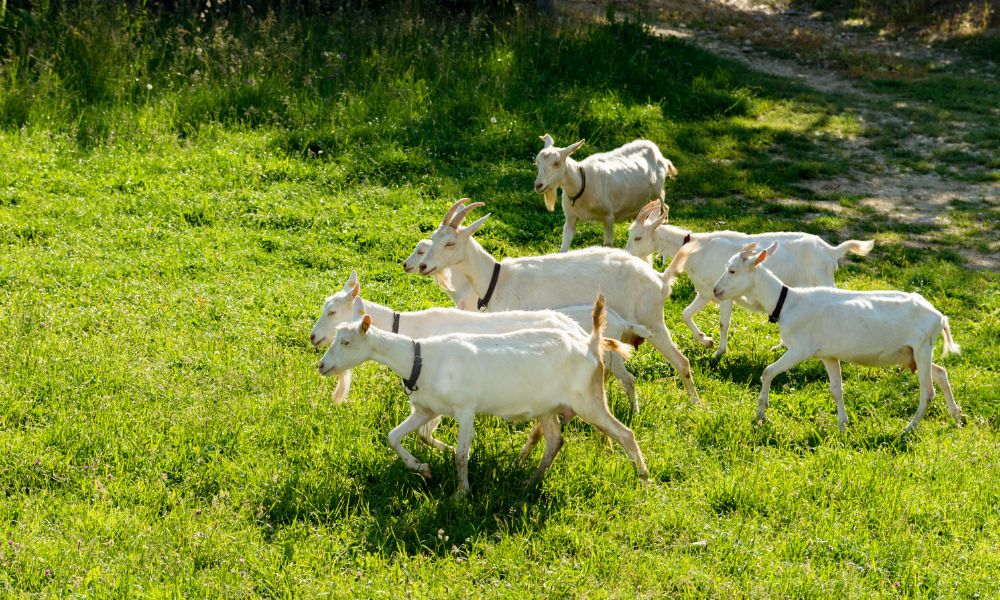Communication is universal, not just among humans but also among our favorite furry friends.
If you’ve been around goats long enough, you’ll have heard many different kinds of bleats as they talk to one another or express some kind of emotion.
Goats are emotional animals and will react to other goats’ emotions similarly to a human.
They are vocal animals and love talking to each other and other creatures (like humans) too.

Why do goats bleat?
Goats will bleat for a variety of reasons, sometimes even just for the sake of it.
But when they are trying to communicate, they produce different sounds depending on their mood and how urgently the matter they are communicating is.
Goats bleat when they are:
Hungry or thirsty
These bleats vary greatly depending on the goat and the situation (although they’re not as frequent, high-pitched, or loud as other bleats), but if you spend a lot of time around a goat you will begin differentiating between these bleats that call for food or water.
Alone
This kind of bleat sounds more like a scream since the goat is trying to be as loud as possible to get the attention of any other goats around.
Goats are very social and will be vocal if left alone for too long.
A young kid will also bleat loudly with their unique sound to call to their mother if left alone.
Stressed
Stressed goats will exhibit frustration through their bleats with a longer, more drawn-out sound that can be both low and high-pitched.
Angry
When they’re angry, goats will snort and make deep bleats to signal their mood.
This bleat is often matched with an action like stomping or head swinging.
In danger
If goats ever see something dangerous, they make a snorting sound together with a loud bleat to make others aware.
If they are in danger, they will let out a high-pitched scream as often as they can to find help.
Ready to mate
Bucks will grumble when they see a doe they would like to mate with.
Such grumbles are low-pitched and softer but are easy to recognize in the context.
Bonding
Mothers and young kids bond by bleating to one another.
In this way, they can learn to recognize each other’s specific bleat signatures.
These bleats are softer and less frequent than others.
Do goats have accents?
Yes, studies have found that goats have unique accents and will adapt their accents depending on the group they’re in.
These accents develop in their herd, giving goats from the same area a similar bleat accent just like humans from the same country has.
A study in 2012 found that goats raised together have a more similar bleat than those raised separately.
If a goat moves to a new herd with a different accent, it may even adapt its accent to match the new herd.
A goat’s bleat also changes as it matures and grows.
A young kid has a high-pitched bleat that becomes deeper as they age.
Related Post – Do Goats Have Accents? (Find Out!)
Do goats make a lot of noise?
Because they are very social animals, goats love communicating with each other.

This does mean that they’re making noise often, even though they’re probably not trying to be rude to the neighbors.
Goats often bleat loudly, since they want everyone to hear what they’re saying.
This is why most people consider goats to be noisy or even loud animals.
It’s best to keep any goats you have in a pasture away from close neighbors and other people that might get frustrated by a goat’s bleating.
Does a male goat (buck) and a female goat (doe) make different noises?
While bucks and does don’t sound very different, bucks will make different noises than does during the breeding season.
Does remain quiet when approached by a potential mate, and the buck will either scream to attract attention or give a low-pitch grumble to communicate his interest.
How do I stop my goat from screaming?
Unfortunately, goats will bleat and scream when they have a need that needs to be fulfilled and won’t stop until that need is met.
The best way to stop a goat from screaming is to figure out what they want and give it to them.
Goats usually won’t scream unnecessarily, so if they are bleating at you they either want attention, food, or water, or they’re stressed for some other reason.
Identify what kind of bleat they’re making or observe what may be the problem and then solve it quickly to stop the bleating.
If you find that your goats are often demanding things like food or attention when you can’t give it, then you may have to suffer through the noise for a while until they learn the routine you’ve set out for them.
Make sure you always follow the routine so the goat knows what to expect and when to expect it.
What other sounds does a goat make besides bleating?
While bleating is a goat’s primary form of communication, they will also make some other sounds in specific situations.
The most common one is the grumble sound bucks make during the breeding season.
Goats will also cough and sneeze like humans do, making a sound that’s almost comical in its similarity.
Goats can burp and fart too (with the appropriate sound), although these are a lot less pleasant sounds than the others.
Related Post – Do Goats Fart? (Answered!)
Our bleating friends may be very verbal, but it just shows how social and communicative they are.
With a little time investment, you’ll be learning to identify your goat’s different bleats and how you can stop any annoying screaming in no time at all.
The different pitches, loudness, and length of the bleats bond the herd together through mutual understanding that you’ll soon appreciate.
More in Sounds
- Do Goats Have Accents?
- Do Goats Purr?
- What Sound Does A Goat Make?
- Why Do Goats Scream?
- Why Do Goats Snort?
